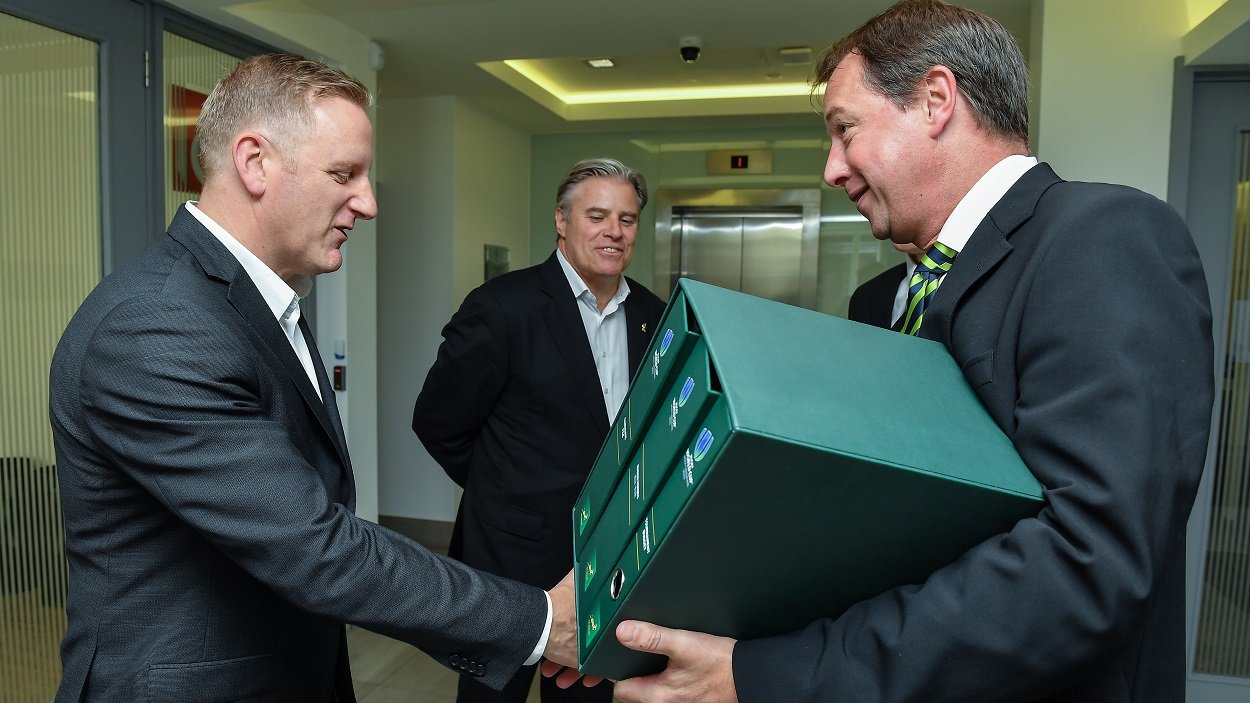World Cup 2023: Last-ditch problems with two bids

Irish and French bids hit stumbling blocks shortly before the deadline for submissions.
Two of the three bids to host the 2023 World Cup hit trouble shortly before the June 1 deadline.
All three bids were submitted to the World Rugby offices in Dublin on time, but the Irish and French bids hit stumbling blocks in the hours leading up to the cut-off time.
The bid has long been regarded as a done deal in Ireland. The country is regarded as the favourite to host the tournament four years after Japan – and the paperwork was delivered by mass parade in Dublin.
#Ireland2023 bid parade https://t.co/mHLZm2HhPv
— Irish Rugby (@IrishRugby) June 1, 2017
But 24 hours before the deadline, sports minister Shane Ross warned the Irish parliament’s committee for Transport, Sport and Tourism that emergency legislation was needed to support the bid.
He said that the Irish government faced “extreme time pressure” to ensure guarantees sought by the organising body can be delivered.
A hastily-assembled bill, approved in cabinet last week, now has to pass through Ireland’s parliament, the Oireachtas, by the summer recess – a matter of weeks away. The urgency means the bill will be debated by TDs without first going through the usual committee stage.
Many are wondering why. In his letter to the committee, Mr Ross said draft guarantees required by Rugby World Cup Limited, the company behind the tournament, were received on April 7. The attorney general advised that primary legislation was necessary on May 4. And yet the issue only came to light the day before the deadline.
Support for the bid is strong in Ireland, so it seems unlikely that this final hurdle will not be overcome.
[rugbypass-ad-banner id=”1473306980″]
Meanwhile, France’s 810-page dossier – the result of four-and-a-half months work by the FFR – champions the nine host cities, the existing and proven big-match stadia which have the capacity to welcome 2.6million fans during the tournament, and the amount of revenue the competition would generate if it was held in l’hexagone.
The bid arrived in Dublin under the protection of Sebastian Chabal.
Arrivée à Dublin, fiers de remettre le dossier de candidature #France2023 à @WorldRugby pic.twitter.com/gUDiwzxdHO
— Bernard Laporte (@BernardLaporte_) June 1, 2017
But, although the bid outlines an obvious intention to use the Stade de France for seven matches – including the opening match and the final – and has a letter of commitment from bosses at the national stadium to host the matches, it still does not have official approval from the government to use the State-owned venue.
This is despite the fact the country’s new president, Emmanuel Macron, joined the welcoming committee when World Rugby officials were wined and dined during a fact-finding visit shortly after his election in May.
The director of France’s bid insists the missing official approval is not an issue. He said the convention between the government and the stadium outlined an obligation to stage international events, and that the necessary documents will be in the bid dossier by July 31.
France’s bid is 17 pages shorter than South Africa’s which was submitted two days before the deadline. Like France, it is going with its track record of hosting major events, and the value for money it offers, with its stadia and infrastructure already in place. Its bid suggests its costs will be 50 percent lower than either Ireland or France.
Jurie Roux, CEO of SA Rugby, delivered our bid book to host RWC 2023 to @WorldRugby HQ in Dublin earlier today. Pic: @GettyImages pic.twitter.com/DyrrYwt84i
— Springboks (@Springboks) May 30, 2017
While there were no last-gasp concerns over the SARU bid, it was still sweating over government support less than a month before the deadline. The country’s sports minister Thulas Nxesi only lifted a ban on the union – along with the country’s cricket and netball authorities – bidding to host major events on May 8.
South Africa has struggled to meet the requirements of won bids for international sporting events. In March, Durban was stripped of its 2022 Commonwealth Games rights after failing to meet costs and building benchmarks.
The three candidate nations will continue lobbying for support until the day of the vote in Dublin, on November 15. The next key date in the process is September 25, when all three will have a chance to state their case in oral presentations. World Rugby will then deliver letters of recommendation outlining the pros and cons of the bids on October 16.






























